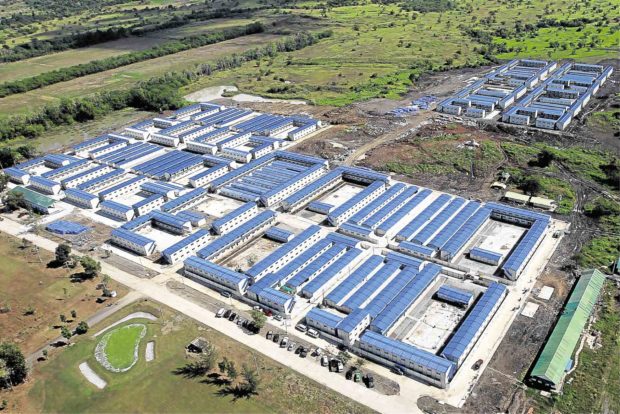1st rehab grads have message of hope to drug users

FIRST, BIGGEST With its 10,000-bed capacity, the DATRC is the government’s biggest rehab center. —INQUIRER PHOTO
FORT RAMON MAGSAYSAY, Palayan City — Fifty-three former drug dependents have graduated from the government’s Drug Abuse Treatment and Rehabilitation Center (DATRC) inside this military camp, the first batch among 453 patients to have completed a four-phase rehab program.
“They prove that drug dependents can change and be rehabilitated,” said Health Secretary Paulyn Jean Ubial, who led the sendoff ceremony here on Friday. “All the rehabilitation graduates are our collective message of hope … an indication that there is hope for drug users who have surrendered.”
“This shows that the government is doing a holistic campaign on anti-illegal drugs by giving real support [toward] the recovery of surrenderers,” said Epimaco Densing III, Interior and Local Government assistant secretary for plans and programs.
Densing said the long-term goal of the DATRC interagency task force was to establish a drug abuse treatment and rehabilitation center in every province, “with the ultimate objective [of making] DATRCs irrelevant because it would mean that there are no more drug addicts, and that we have won the war on drugs.”
President Duterte spoke to the DATRC graduates via a videotaped message. “As you return to your communities, I sincerely hope that you become law abiding, upright members of society,” he told them.
High-value target
In their “oath of change” administered by Nueva Ecija Prosecutor Danilo Yang, the former patients promised to work as advocates against drug addiction.
One of them was a village chief, who said rehabilitation had spared him from being targeted by vigilantes or from becoming a high value target of the police.
DATRC medical chief Dr. Nelson Dancel said the former patients had completed the rehab center’s in-house treatment program that lasts from six to eight months, but would still undergo an aftercare program that would not exceed 18 months.
Thirty-three of the former drug dependents came from Batangas province, nine from Pampanga and eight from Nueva Ecija. The rest came from the provinces of La Union, Tarlac and Pangasinan.
Transition period
Dancel said patients at the rehab center underwent a month and a half of counseling for “emotional and motivational self-acceptance.” Another two months are spent helping them “identify and embrace their personal strengths and weaknesses,” while two and a half months are meant to get them to transition from “self-formation to self-direction” to prepare them for reintegration into the community.
Patients also undergo a one-month transition period at the end of the sessions.
“These [aspects of treatment] can be extended depending on the [patients’] performance. Poor performers can be demoted,” Dancel said.
With its 10,000-bed capacity, the DATRC was the first and biggest drug rehab center put up by the Duterte administration.
Ubial said the treatment of drug patients was one of three priorities that President Duterte had laid out on her first day in office in July 2016.
She said the Department of Health was on track to establish seven more rehabilitation and treatment centers. It has so far established 13 regional rehab centers and is building five more centers in the Cordillera region, Mimaropa (Region 4-B composed of southwestern Tagalog provinces), Region 12 (composed of South Cotabato, Cotabato, Sultan Kudarat and Sarangani provinces and General Santos City), Region 9 (Zamboanga peninsula) and Negros islands. —Reports from Armand Galang and Jeannette I. Andrade














